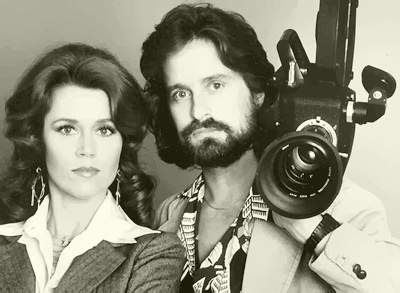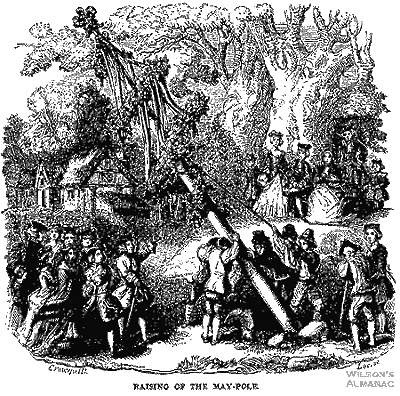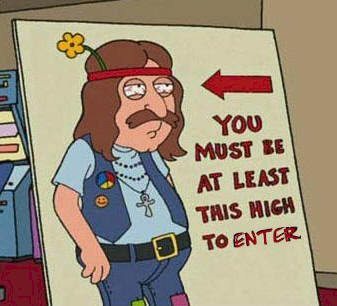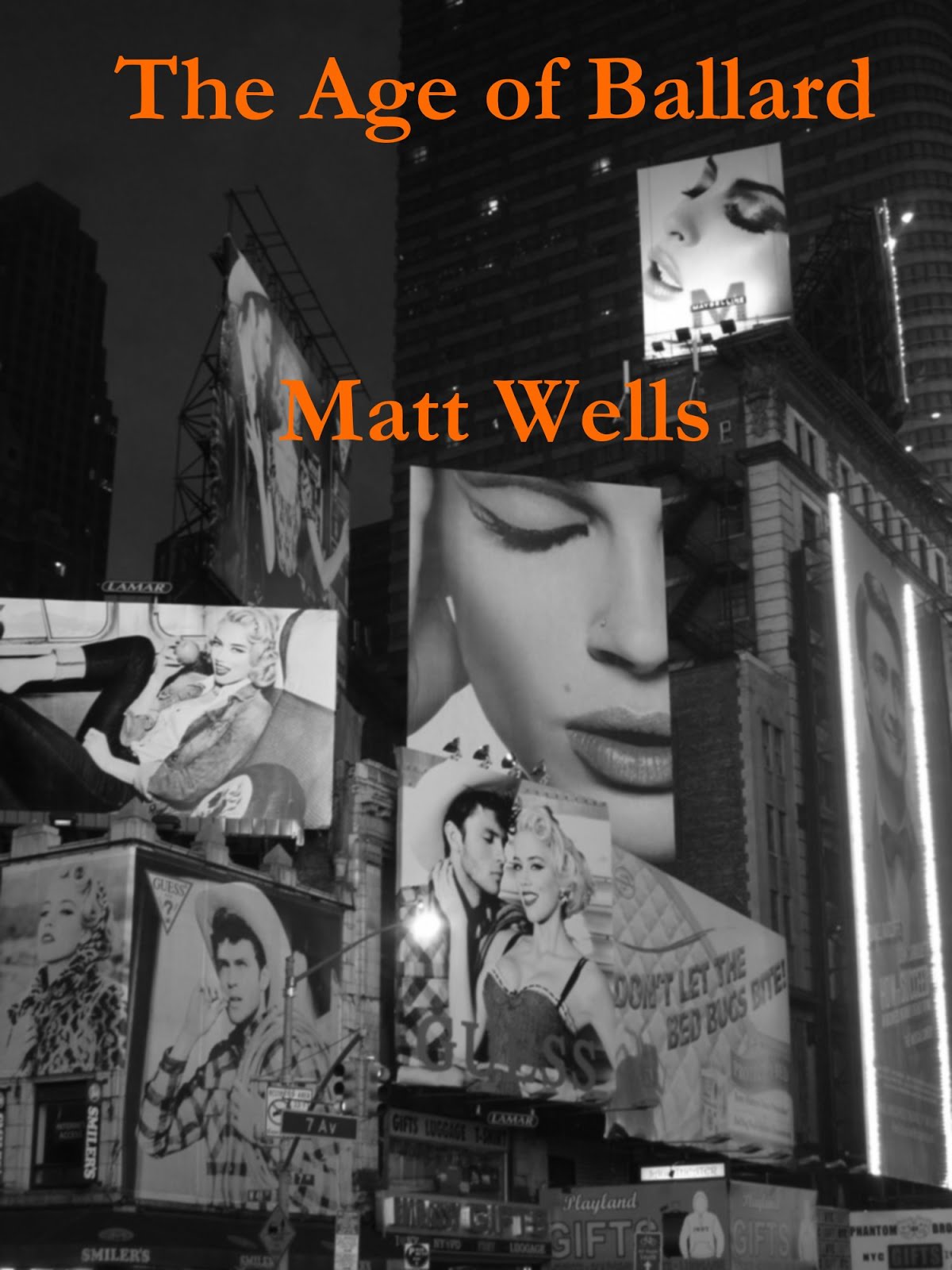
Personal disclaimer: I never went. I wasn't there. The closest I came to Woodstock was in September of 1969, first week of senior year in high school, when I was listening to Charlie Chiasson talk about how he and his friends drove up there, got caught in the traffic jam, wound up partying with a bunch of total strangers, felt gypped when the concert was declared free, and then felt claustrophobic when the entire under-20 population of the East Coast showed up because the concert was declared free. My clearest memory is of him pointing to a picture in Life Magazine and yelling: "We were right there! If the shot had been two feet to the left we'd be in that picture!" Since then I have heard the same thing from at least two dozen other people who were there: "Oh my God, do you see this picture? We were right behind these people! And if the camera had ju-u-u-ust panned a little to the left . . ."

Damn! I'm right behind the guy in the white vest!
So listening to Charlie, and watching the movie, and playing the album, are the sum total of my 3 Days Of Peace And Love experience. No. I wasn't there. Not physically, anyway. But like everybody else who was 17 in 1969? I've been there ever since. And like everybody else with an internet connection and a laptop? I've been inundated with 40th-anniversary articles, which means that (whether I want to or not) I'm thinking about What It All Means. And because it's me, I'm thinking a little too much, which is why I've come up with ten different ways of looking at Woodstock:
It was La Cigale et la Fourmi. (The Grasshopper and the Ant.) When I was 13, my French teacher Mr. Guillaume made us all memorize the La Fontaine fable about the grasshopper and the ant:
La cigale ayant chanté
Tout l'été,
Se trouva fort dépourvue
Quand la bise fut venue:
Pas un seul petit morceau
De mouche ou de vermisseau.
Elle alla crier famine
Chez la fourmi sa voisine,
La priant de lui prêter
Quelque grain pour subsister
Jusqu’à la saison nouvelle.
«Je vous paierai, lui dit-elle,
Avant l’août, foi d’animal,
Intérêt et principal.»
La fourmi n’est pas prêteuse:
C’est là son moindre défaut.
«Que faisiez-vous au temps chaud?
Dit-elle à cette emprunteuse.
— Nuit et jour à tout venant
Je chantais, ne vous déplaise.
— Vous chantiez? J’en suis fort aise:
Eh bien! Dansez maintenant.»
Tout l'été,
Se trouva fort dépourvue
Quand la bise fut venue:
Pas un seul petit morceau
De mouche ou de vermisseau.
Elle alla crier famine
Chez la fourmi sa voisine,
La priant de lui prêter
Quelque grain pour subsister
Jusqu’à la saison nouvelle.
«Je vous paierai, lui dit-elle,
Avant l’août, foi d’animal,
Intérêt et principal.»
La fourmi n’est pas prêteuse:
C’est là son moindre défaut.
«Que faisiez-vous au temps chaud?
Dit-elle à cette emprunteuse.
— Nuit et jour à tout venant
Je chantais, ne vous déplaise.
— Vous chantiez? J’en suis fort aise:
Eh bien! Dansez maintenant.»

I have to confess, I can’t rattle it off with the same ease that I can recite the proem to The Odyssey or the opening to The Canterbury Tales, two pieces I memorized in high school, but every now and then I still catch myself saying “La priant de lui prêter,” because it’s so musical, or “Eh bien! Dansez maintenant,” because it’s so appropriate. And it’s particularly appropriate to Woodstock, because a lot of the right-wing disgust for long-hairs, hippies, and rock-music-lovers is nothing but worker-ant resentment that other people are having a good time while you're slaving away to pay the bills and put food on the table. It’s the eternal war between Scrooge and Cratchit, which is probably why everybody who grouses about Woodstock winds up sounding like Lionel Barrymore in It’s A Wonderful Life. “Look at those kids, laughing and dancing and having a good time. What do they have to laugh about? Work is more important than laughter. And money is more important than work. Go ahead -– dance. Try paying for a meal with dancing. Try paying for anything with peace and love, you lousy kids.” I mean seriously -- wouldn’t you run off to a farm in New York just to give this kind of guy the finger?

It was the birthplace of the left-wing media bias.

Oh look! A traitor and a hippie!
When the New York-based media covered Woodstock, they didn’t just report it -– they promoted it, the way the New York-based media promotes anything that happens within driving distance of Rockefeller Center, and they told the world that it was Something Significant And Of National Importance. But when, as part of this promotion, the NYBM reported that it was a good thing when 500,000 young people did drugs and had sex without killing each other, that's when they got branded as biased. Couldn't they see, like normal everyday Americans, that it's NOT a good thing when 500,000 kids get together to do drugs, have sex and listen to music and don't get killed?
NORMAL EVERYDAY AMERICANS EVERYWHERE: It's actually a BAD thing. Somebody's going to get hurt! You mark my words! And it'll be your fault, Mr. Reporter, because you said it was GOOD.
Yes, those three days in August were when the Liberal Media Bias was born in the eyes of conservative Republicans everywhere, who secretly wished for someone to have died of an overdose during the Hendrix "Star-Spangled Banner," and got their wish in spades at Altamont. Ever since then, to hear the Right tell it, the NYBM has been rightfully (pun intended) tarred and feathered as the willing dupe of anything liberal, countercultural, or left-wing. In a sense, by blowing the original story way out of proportion, the NYBM not only created a monster, they became one themselves, sort of like how Frankenstein is not just the scientist but the Creature as well.
And speaking of blowing things out of proportion:

It was the best one-night stand ever. Not a date. Not a relationship. And certainly not a marriage. This was the one night in your life where everything came together, the kind of moment that is only perfect in retrospect because of how many imperfect moments followed it. The “If only I had known this was the height, I would have enjoyed it more” moment you never forget, and always talk about. Woodstock was not, as Time Magazine called it, “one of the significant political and sociological events of the age.” Puh-lease. It was a camping weekend with music, people. Nobody said, “Hey let’s go to Yasgur’s farm to make a political and sociological statement.” They said, “Hey, wanna go hear some great music? All the best bands will be there. Plus girls! Girls!!!” (And yet. Could you have had Woodstock without Vietnam? I don't think so. And The Powers That Be understood that. So did the kids at the concert. They both knew that rock music in its infancy was a political statement, something that pushed the envelope of expression and dissent. So did all the AM radio stations that bleeped out "Thou shalt not kill" from the end of "Sky Pilot." So did everybody who sang along to Country Joe's "I-Feel-Like-I'm-Fixin'-To-Die Rag." It was always about The War.)

But on the surface? It was all about good tunes, good times and good-looking babes. And I’m sorry, but despite the worst fears of the Far Right, there has never yet been a successful political revolution based on free music and available girls. But it does say something very specific about those who ARE terrified that bass guitars and booty are a threat to Our Way Of Life. Because the only way that terror can exist is if, deep down, there is an awareness of how precarious and unbalanced Our Way Of Life is -- how weak it is, how ineffectual –- how it can shatter with the slightest of attacks -- how even a song or a kiss can blow it away. Think about that the next time you hear somebody using “Woodstock” as a belittling synonym for anything but a three-day concert. Think about how, if something’s harmless, you never have to belittle it at all.
.jpg)
William F. Buckley's worst nightmare.

William F. Buckley's second-worst nightmare.
That's Ronald Reagan on the right.
It was the Little Big Horn.

The Sioux and Cheyenne who walked all over Custer like he was a throw rug didn’t know that this battle was their last dance. But it was. It was like Wakan Tanka gave them one big send-off before he sent them off to the reservation, and turned the great garden which they called home into just another territory on the scale map of the Wasichu world. What the People and the Human Beings thought was going to be the start of something great and permanent was actually the last wild moment of freedom they ever enjoyed, the kind of event they could look back on and say, “Well, at least we did that, huh?” The kind of event which, as the years went by, became more and more unbelievable, not just because of what happened after –- the murder of Crazy Horse, the Ghost Dance movement, the murder of Sitting Bull, Wounded Knee -- but because of what didn’t happen. So it is with Woodstock. All the might-have-beens are enshrined in a book called Bury My Heart At Altamont.

Damn! My tipi is right behind the one on the left!
It was the earthbound equivalent of the Moon Landing. No, it wasn’t planned, and Abbie Hoffmann didn’t stand up in front of a crowd and say in a bad Boston accent: “Ask not how the over-thirties are sticking it to you; ask how you can stick it to the over-thirties.” Think of it as an unplanned moon launch, something so beyond the ken of the Geriatric Hive Mind that it hit them ten times as hard as the Sputnik launch hit the Pentagon. And just like NASA, once we proved we could do it, we never went back. Apollo was not followed by Ares, any more than Woodstock was followed by Earthstock or Firestock or Waterstock.

A crowd half a million strong proved they could live together in Edenic harmony for three days; but saying "we have to get ourselves back to the garden" shows a troubling ignorance of how this particular garden makes it a point to appear and disappear like Brigadoon, age the shit out of you like Shangri-La whenever you stay for too long and try to leave, and end in bitterness and violence like Camelot. It's like the island on which sailors can only land once –- the magical store shoppers can only visit once -- the perfect place that isn’t there when you try to find it again, because you can never leave more than one footprint on its surface. Topics for discussion? Compare and contrast: Altamont and Chappaquiddick. Lollapalooza and the Shuttle Program. The garden and The Garden.

It was a cultural tipping point. If Woodstock was a Civil War general, it would have been Sherman, because on the cultural front, it burned down a ton of Atlantas on its march to the sea. It identified the youth market as a viable consumer target. It gave birth to the lifestyle as a way of life. It created the fascism of cool, with its nose-in-the-air Went There/Saw That smugness. And the event itself marks one of the last times in our culture when parents and children spoke two different musical languages. Musically, in '69, there was AM and FM. Parents listened to AM; kids listened to FM. My father would never have gone up to me and asked “Hey, what’s that song you’re listening to?” the way I’ve gone up to my nephews and nieces. It wouldn’t have even occurred to him, because to him, what I was listening to wasn’t music, it was just noise. And I wonder. There’s very little out there that’s just noise to me. So does that mean my range of acceptance is wider, or does it mean that everything out there is so homogenized that it doesn’t piss me off the way, say, Hendrix pissed off my parents? (Topic for a future post.) In any case (as my father would say), since Woodstock, there has been a tremendous cross-generational pollination in the culture. The dominant culture subsumed the counterculture like the Catholic Church embraced St. Francis of Assisi, and for exactly the same reason: because it was the enemy, and the best way to deal with an enemy is to marry him into your family. Except now all your kids look like him instead of you. Didn't see that one coming, did you, Dominant Culture? God knows I didn't either. Back in my day, my parents and I never bumped into each other when we went record shopping. And nowadays, for better or worse, parents and kids do business at two different branches of the same cultural bank. Except, of course, when it comes to the internets. Today, God help us, you could squeeze 500,000 17-year-olds into the same chat room and nobody over 30 would even know about it. Worlds of Woodstock, anybody?

"God damn hippie! Get a job!"
It was not Altamont. I keep bringing up Altamont like (a) it's shorthand for The Day The Music Died and (b) you know what I'm talking about. For those of you who don't? It was the other free concert of 1969, held at the Altamont Speedway in California on December 6, and though it shared a lot of bands, it had two things Woodstock didn't have: the Rolling Stones, and four people dying -- two in a hit-and-run, one by drowning in an irrigation canal, and a kid named Meredith Hunter getting stabbed to death by a Hell's Angel while the Stones played "Under My Thumb." All of which is recorded for posterity in the movie Gimme Shelter. (Rent it if you don't own it.)

Because of the violence and the deaths, Altamont became the secret sharer of Woodstock the way a hangover is the secret sharer of a wild night on the town. "See what you get?" goes the lesson. "See what happens? Huh?" And the same reporters who helped to christen the Woodstock Nation in August now proclaimed four months later that the baby was dead, thus fulfilling their threefold hortatory function of (1) identifying a problem, (2) scaring you to death with it, and then (3) reassuring you that It Can't Happen Here or that The Menace Is No More.
THE MEDIA: See? You were worried for nothing. Those crazy kids are going to have to grow up now. They've learned their lesson. And if they haven't? Don't worry -- we'll be here to remind them of it. Every time somebody says "Woodstock," we'll say "Altamont."
THE YOUTH OF AMERICA: Thanks a lot. [Insert sarcastic emoticon here.]

Scariest thought ever: all these people are in their 60's now.
It was the East Coast playing catch-up again. Ever wonder why Woodstock didn’t happen right after the Summer of Love? It’s because it takes about two to three years for a cultural shift which originates on the West Coast to make it East, by which time it’s totally corporatized, institutionalized, and homogenized. This includes fashions, Tex-Mex restaurants, Starbucks coffee, and the youth movement, which peaked in San Francisco in 1967. And also politics. When you consider that between 1970 and 2008, the country was run almost exclusively by (a) the losers who never went to Woodstock and (b) the dweebs who would have been mocked by those who did go, then, once again, California was ahead of the curve, by electing Ronald Reagan in all his anti-hippie glory to get them as far away from the Berkeley Movement as possible. Modern footnote to all this: you know the way California is going bankrupt right now? That’s New York in two years.

Waitaminnit -- is that a gay slur?
It was the Maypole at Merry Mount. Come with me now back to those thrilling days of yesteryear, when jollity and gloom contended for an empire, and the entire cultural history of the United States was epitomized by a single event. In what is now Wollaston, Massachusetts, in the early 1600’s, there was a Maypole around which the local citizens danced their days away, electing a King and Queen of the May who put flowers in their hair and banished sorrow and drudgery as part of their kingdom. Which was an affront to the faith of a group of nearby Puritans, dismal wretches for whom grimness and toil were the lot of man, and God help anybody who said otherwise. So they chopped the Maypole down, forced the merrymakers to wear sober clothes and get haircuts, and they all lived unhappily ever after. Because the war between freedom and repression didn’t end at Merry Mount; just the battle. We’ve been fighting the war ever since.

The thing about Puritans is, they denounce idle merrymaking as ungodly with the kind of violent fervor that possesses the erotically repressed whenever they speak out against sexual liberation. So you have to wonder if there’s not something a little, well, envious about the Puritan’s uncompromising hatred of fun. (Think The Church of the Ant against the Godless grasshopper.) The other thing about Puritans is, their response is always way out of proportion to the provocation –- another American tradition. You would think that the normal sane response to Woodstock would be: “Oh, it’s just kids being kids.” But judging by the puritanical reaction to this particular maypole, Woodstock was an atomic bomb whose crater was a hundred times bigger than its actual explosion. You could hear the grumbling all across the country:
“We just landed on the moon and our children are dancing in mud.”
“We’re at war and these lousy draft dodgers are dancing and fucking and doing drugs instead of serving in the military like I did.”
“And they’re all getting laid. I didn’t get laid when I was 17. I didn’t get laid till I was in the Army.”
“And what is this ‘laid’ anyway? Foundations get laid. Plans get laid. People don’t get laid.”
“And wait -- girls can get laid now without fear of getting pregnant? How come kids today get to have all the fun? That’s not fair!”
And there you have American Puritanism in a nutshell: they believe that life isn’t fair, and they’ll get you to believe it by making sure your life is so miserable you wind up whining about it as loudly as they do. If they had their way, they would erase the word “happiness” from the Declaration of Independence and replace it with the words “Jesus Christ.” To which I can only say: "Jesus Christ!"

"Jesus H Christ on a Harley Davidson!"
It was fun. In an age when the ants have taken over the world, and kids in their teens are scared to death they'll graduate college without a job, and kids in their pre-teens aren't even kids any more, just adults in training, it's frightening to think that something as spontaneous and silly and downright improbable as Woodstock can never (ever) happen again. If 500,000 young’ns got together in a single physical location this Friday, there would be cops everywhere, helicopters everywhere, security everywhere. Hell, you can’t even mill around in Times Square on New Year’s Eve the way you used to any more without being herded into cattle-pen spaces. It's all of a piece -- New Year's Eve used to be fun, the Village Halloween Parade used to be fun, the Coney Island Mermaid Parade used to be fun -- and it's all because they started out spontaneous and local and ended up becoming regimented, crowded, and joyless. You go to say you've been there, not to have a good time.

Well, that wasn't Woodstock. People went to have a good time. Did they know they were attending something historic? Probably. But who among them seriously thought that history could be made by 500,000 people listening to music? I bet more than half of them kept looking around with a stupid-ass grin on their faces and saying, "Will you look at all these crazy people? And I'm one of them! Whoo hoo!" That's what I would have said, anyway -- along with "Down in front!" and "Whipping Post!" And for all the aggravations -- the mud and the lines at the portable bathrooms and the crowds -- I can't see a single person walking away from that weekend without feeling exhilirated. Which, in a world run by ants, is not something you feel very often, if at all.

People can and will talk about what Woodstock means till long after everybody who was there in person is dead and in their graves. But after all is said, and re-said, and interpreted, and explained, there still remains the one thing that got everybody there, kept everybody there, and made everybody happy. The music. Three days of peace and music, and for a while there, it looked like it could change the world.
THE ANTS: You're crazy. How can something like that change the world?
ME: You wouldn't understand
THE ANTS: Why not?
ME: You're not a grasshopper. Now get your foot off my fiddle.



2 comments:
Bravo, grasshopper !
Post a Comment